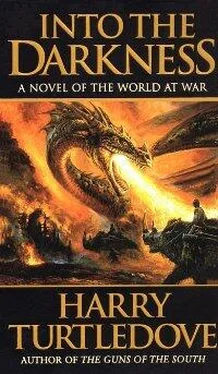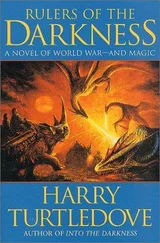Pushing forward as he did, paying more heed to what the enemy soldiers in tan kilts were trying to do than to exactly where he was, Skarnu was surprised when he burst out of the woods. He stood a moment, blinking in the bright afternoon sun that beat into his face. Ahead lay fields of barley and oats going from green to gold, and beyond them an Algarvian farming village. The sturdy buildings would have looked more picturesque had he not been able to make out Algarvian troops moving among them.
Algarvian troops rather closer by could make him out. One of them blazed at him from the cover of the growing grain. The beam went wide. Cursing, Skarnu ducked back among the trees. He went some little distance along the edge of the forest before peering out again. This time, he was careful to keep a screen of leaves and branches in front of his face.
As if by sorcery, Sergeant Raunu silently materialized beside him. “Wouldn’t want to try crossing that without a lot of friends along,” Raunu remarked in matter-of-fact tones. “Truth is, I wouldn’t want to cross that even with a lot of friends along, but some of us might get to the other side if we did it like that.”
Skarnu’s voice was dry: “I hadn’t planned on ordering us to cross those fields and seize that village.”
“Powers above and powers below be praised,” Raunu muttered.
Not knowing whether he was supposed to have heard him, Skarnu pretended he hadn’t. He pulled a map out of a tunic pocket. “That should be the village of Bonorva,” he said. “It’s past those woods on the other wide that the Algarvians are supposed to have their main belt of fortifications.”
Raunu nodded. “Aye, that makes sense, lord. The forts are too far back for us to fling eggs at ’em from our side of the border.”
Skarnu whistled thoughtfully. That hadn’t occurred to him. Raunu might be a sausage-seller’s son, but he was no fool. Many Valmieran nobles assumed all those below them to be fools: Skarnu chuckled, thinking of his sister. He had less of that attitude in him, but he wasn’t free of it, either.
“They’ll have to bring everyone up for the assault on the forts,” he said. “That will make taking Bonorva look like a walk in Two Rivers Park by comparison.”
“It’ll cost a deal of blood, all right,” Raunu agreed. “I wonder how many who hit the forts from this side will make it through to the other.”
“However many they are, they’ll be in position to peel the shell off Algarve, the way you do with a plump lobster,” Skarnu said.
“I wouldn’t know about that, sir,” Raunu said. “It’s bread and sausage and fruit for the likes of me. But you can’t peel anything if you don’t get through. Anybody who fought in the Six Years’ War would tell you that.”
All of Valmiera’s generals, like those of any other kingdom, were veterans of the war a generation earlier. But Skarnu was not thinking of other kingdoms; he was thinking of his own. “ That’s why we haven’t pressed our attacks harder!” he exclaimed with the air of a man who’d had a revelation. “The commanders dread the casualties they’d cost.”
“Commanders who don’t dread casualties don’t stay in command, either,” Raunu said. “After a while, the troops won’t stand any more. Jelgava had mutinies during the Six Years’ War. The Unkerlanter armies that were fighting Algarve mutinied so they could go off and fight each other—Unkerlanters are fools, you ask me. And finally the Algarvians mutinied, too. That’s what won the war for us, more than anything else.”
It was history to Skarnu; Raunu had lived it. Skarnu said, “May they mutiny again, then. If they didn’t want a war, they shouldn’t have gone tramping into Ban.”
“I suppose that’s so, sir.” Raunu sighed, then chuckled. “I’m an old soldier at heart, and I make no bones about it. I’d sooner be back in the barracks drinking beer than here in the middle of this powersforsaken country.”
“Can’t blame you for that, but when the king and his ministers order, we obey,” Skarnu said, and the sergeant nodded. Skarnu withdrew deeper into the woods, then scribbled a note describing his company’s position and called for a runner. When a man came up, Skarnu gave him the note and said, “Take this back to headquarters. If they plan on bringing reinforcements forward, hurry back to let me know. That will tell me whether to prepare another attack or to settle in and defend what we’ve gained here.”
“Aye, sir—just as you say.” The runner hurried off.
“The Algarvians will have something to say about whether we attack or defend, too, sir,” Raunu observed, pointing west.
“Mm, that’s true,” Skarnu said, not altogether happily. “That’s one reason I wish we’d pressed this opening attack harder: the better to impose our will on the enemy.”
Raunu grunted. “The Algarvians have plenty of will of their own. I’m surprised they haven’t tried imposing theirs on us.”
“They’re beset from four sides at once,” Skarnu said. “Before long, they’ll break somewhere.” Raunu grunted again. A few minutes later, the runner came back with orders for Skarnu’s men to consolidate their position. He obeyed, as he was obliged to obey. If he muttered under his breath, that was his business, and no one else’s.
High above Vanai’s head, a dragon screamed. She craned her neck, trying to find the tiny dot in the sky. At last, she did. The dragon was flying from west to east, which meant it belonged to Forthweg, not Algarve. Vanai waved, though the man aboard the dragon could not possibly have seen her.
Brivibas walked on for several steps before realizing she was no longer beside him. He looked back over his shoulder. “The work won’t wait,” he snapped, exasperated enough to speak Forthwegian instead of Kaunian without even knowing he’d done it.
“I am sorry, my grandfather.” Vanai spoke Kaunian. Her grandfather would have given her much more of the rough side of his tongue if she’d made his slip. He was so confident of his inalterable Kaunianity, he could slip its bounds now and then. If anyone younger slipped, though, he would fret for days about dilution.
Vanai hurried to catch up with him. Her short, tight tunic and close-fitting trousers rubbed at her as she ran. She envied the Forthwegian girls her age their comfortable, loose-fitting long tunics. Such clothes suited Forthweg’s warm, dry climate far better than what she wore. But the folk of the Kaunian Empire had worn short, tight tunics and trousers, and so their descendants perforce did likewise.
“My grandfather, are you certain you know where this old power point lay?” she asked after a long, sweaty while. “We’ve walked more than halfway to Gromheort, or so it seems.”
“Say not Gromheort,” Brivibas replied. “Say rather Jekabpils, the name the city knew in more glorious times.” On he went, tireless for an old man: he had to be nearly sixty. To Vanai, at sixteen, that certainly seemed ancient.
Her grandfather took from the pack he wore on his back an instrument of his own design: two wings of gold leaf suspended inside a glass sphere by gold wire. He murmured words of command in a Kaunian dialect archaic even when the Empire was at its height.
One of the wings twitched. “Ah, good. This way,” Brivibas said, and set off across a meadow, through an almond grove, and then into a nasty stretch of bushes and shrubs, most of which proved well equipped with spines and thorns. At last, after what seemed to Vanai far too long, he stopped. Both gold wings were fluttering, neither higher than the other, Brivibas beamed. “Here we are.”
“Here we are,” Vanai agreed in a hollow voice. She had her doubts anyone else had ever been here before. In lieu of stating them more openly, she asked, “Did the ancient Kaunians truly know of this place?”
Читать дальше












